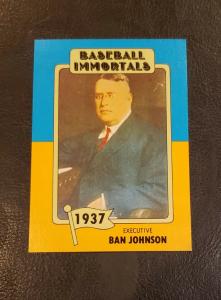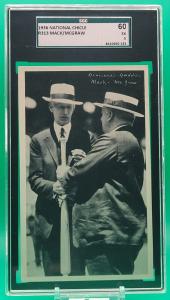John McGraw was a figure like no other in the world of baseball. He wasn’t just a player; he was a force that shaped the game. Born on April 7, 1873, McGraw quickly caught attention with his impressive skills. He joined the Baltimore Orioles in 1891, where he showcased his talent as a third baseman. His passion for the game and natural talent earned him a spot in the spotlight.
What set McGraw apart wasn’t just his playing ability but his sharp mind for strategy. After a solid playing career, he transitioned into managing. In 1902, he took the helm of the New York Giants, and that’s when his legend truly began. Under his leadership, the Giants rose to glory, winning three World Series titles and many pennants. His intense personality and fierce determination inspired his players to give their all on the field.
McGraw had a unique way of connecting with the crowd. He understood how to engage fans and make baseball an exciting spectacle. His fiery demeanor and competitive spirit made him a beloved figure. He didn’t just want to win; he wanted to leave a legacy. And he did, becoming one of the most respected managers in the history of the sport.
With a career that spanned several decades, McGraw's impact on baseball is undeniable. He was inducted into the Baseball Hall of Fame in 1937, a fitting tribute to a man who breathed life into the game. His journey from a young player to a legendary manager showcases the passion and dedication that has inspired generations of baseball lovers.
Key Moments in McGraw's Career
John McGraw kicked off his legendary career in 1891, playing for the Baltimore Orioles. He quickly showed he was more than just a player. As a fiery competitor, he won two National League pennants in 1894 and 1895. Those early days set the stage for his future as a brilliant manager.
In 1901, McGraw took over as the manager of the New York Giants. This was a big deal! He wasn't just trying to lead a team; he was creating a dynasty. Under his guidance, the Giants won three World Series titles in 1905, 1921, and 1922. His knack for bringing out the best in players truly shone during these years.
McGraw was known for his intense and often controversial style. He'd argue with umpires, get into scuffles with other managers, and never backed down from a challenge. This fierce personality helped him build a team that didn’t just play hard; they played smart. He had a way of strategizing that left other teams guessing.
During his time with the Giants, McGraw also planned for the future. He recognized talent early on, helping to develop stars like Christy Mathewson and Mel Ott. His ability to spot and nurture talent was a key part of his success.
By the time he stepped away from the field, McGraw had racked up over 2,800 wins. His impact on baseball was massive, and his induction into the Hall of Fame in 1937 was a well-deserved honor. McGraw wasn’t just a manager; he was a game-changer who left a lasting legacy in the sport.
Baseball Immortals #7 Ban Johnson Card
A must-have card that celebrates the legacy of baseball's greats
Product information
$1.99
Product Review Score
4.94 out of 5 stars
7 reviewsProduct links
McGraw's Impact on Baseball History
John McGraw wasn’t just a manager; he was a game-changer in baseball history. Managing from the early 1900s, he transformed the way the game was played. Thanks to his fierce passion and sharp strategies, teams began to focus on speed and aggressive play, redefining what it meant to win.
McGraw led the New York Giants to three World Series titles and made quite a name for himself along the way. His famous “small ball” tactics encouraged players to steal bases and lay down bunts, which added excitement and unpredictability to the game. Fans couldn’t get enough, and attendance soared as people flocked to see his Giants play.
His personality was as colorful as his coaching style. Known for his fiery temper and unmatched competitiveness, McGraw wasn't afraid to ruffle some feathers, both in the dugout and with umpires. That spirit ignited his players. They played their hearts out for him, motivated by his fiery demeanor and unwavering belief in their potential.
Beyond the diamond, McGraw helped shape the landscape of baseball itself. He was a key figure in forming the Players' Union, advocating for player rights and fair treatment. His influence stretched beyond his tenure, leaving an indelible mark on the game that continues to be felt today. Even after he took off the uniform, his impact remained a vital part of baseball's legacy.
1936 R313 National Chicle Connie Mack John McGraw Card
Own a piece of history with this rare 1936 National Chicle Connie Mack John McGraw card that’s perfect for any sports card collection
Product information
$399.00
Product Review Score
4.69 out of 5 stars
131 reviewsProduct links
Lessons from McGraw's Journey
John McGraw’s journey to the Hall of Fame is packed with lessons that every baseball fan and aspiring player can appreciate. He was known for his fierce determination and relentless work ethic. Early in his career, McGraw realized that skill wasn’t the only thing that mattered in baseball. His hustle, understanding of the game, and ability to motivate his team were just as important.
One big takeaway from McGraw’s story is the importance of adaptation. The game of baseball changed a lot during McGraw’s time, and he didn’t just stick to what he knew. He evolved his strategies to match the shifting styles of play, and that kept his teams competitive. No matter what, he always looked for new ways to win.
Another lesson is all about teamwork. McGraw knew that a single player couldn’t carry a team to victory alone. He invested time in building strong relationships with his players. He listened to them, respected their opinions, and fostered a sense of camaraderie that helped them shine together on the field.
Lastly, McGraw’s journey underscores the value of resilience. He faced his share of setbacks, but he never let them keep him down. Instead, he used failures as stepping stones to learn and grow. His ability to bounce back from tough situations is a reminder that persistence pays off, especially in sports.


